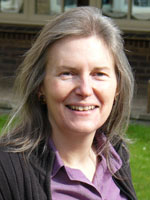Let's find time to talk - Reform article
Let's find time to talk
 Kirsty Thorpe
Kirsty Thorpe
With any good idea, the test comes when you try to take it from a small group, who've been working on it for some time, and share it with more people so they get interested too. That's the challenge facing Vision4Life this spring.
General Assembly said last year 'Yes, we want to invite congregations to do Vision4Life together'. But It's quite another thing for people to start receiving mailings of taster material through the post, as they will be doing shortly now, and wondering what they're going to do with them.
So what will your minister or church secretary find when they open that envelope? There will be copies of four different but related booklets, with material for conversations about the three Vision4Life themes of the Bible, prayer and evangelism. These booklets are for those people who will be leading sessions on the material and include photocopiable worksheets for group work.
It's up to each congregation to decide how best to set up these conversations and start engaging people. There's enough material on each of the three themes to fill at least three 90 minute sessions. Your elders, who will probably look at the booklets first, may decide to give the process more time than this - and the material would certainly benefit from room to explore the questions it asks - or they may feel your church needs to pick and choose certain elements on each theme.
The fourth booklet, which is different from the other three, simply suggests how you might take Vison4Life forward in your congregation once you've had conversations on the Bible, prayer and evangelism. It also has ideas for a Vision4Life service which you might choose to use this autumn, to launch your congregation's involvement in the process within Sunday worship.
There's nothing in the three conversation booklets that lays down how you have to use the material. It may suit your congregation to feed Vision4Life into any existing Bible study, prayer or other groups you have. You may weave the ideas into Sunday services, or present them in your church meeting, or put on a series of special events with food to help introduce people to the process in a sociable way. When you're planning this stage of things try to remember groups who might get overlooked or left out without some extra thought on how to draw them in - children, young people and the housebound perhaps.
The most important thing is that people start experiencing how it feels to sit and talk with their fellow worshippers about some of the most important, yet least explored, parts of our church life together.
It's the leaders in the congregations who are best placed to know how to make that happen. If your church has already decided to do something similar in another way - through a local programme or Hope 2008 - that doesn't need to be in competition with Vision4Life. Choose from the menu what you think will work for you - the material lends itself to adaptation.
In case you're wondering where the taster material comes from, it has grown from discussions more than two years ago, when a group of people from across the denomination were talking about how to renew our focus on three main strands of our tradition - the Bible, prayer and evangelism. Paul Snell, who was present, came up with the title Vision4Life and designed the logo to go with it.
Then John Campbell, principal of Northern College, Manchester, devoted his sabbatical last year to working on the process. He wrote and tried out the conversations on the Bible, prayer and evangelism, sharing them with the Vision4Life steering group last autumn. Since then Mike Walsh and Kirsty Thorpe have been editing content and layout, and the final look of the booklets owes much to the skills of photographer and designer Mark Howard.
We have invested in making the booklets attractive and user friendly. Some of the questions in the conversations may look quite simple but take care - they actually set the bar quite high because they expect people to step outside their normal comfort zone and start talking about their personal faith in a way we may not often do.
That means one key to making the process work is the presence of skilled leaders who put the material over well, ensure people listen carefully to each other, and enable all voices be heard. Already, many of the Synod training officers have had a preparation session on Vision4Life so they will be good sources of advice and encouragement for you on how to use the material. From April 28 to30 there's also a course at the Windermere Centre training people to be Vision4Life advocates and help get the word out.
The booklets this spring represent the first stage of an unfolding process. There's also the website - www.urc.org.uk - which will have worship materials and other information about the next stages, starting with the Bible Year in Advent 2008. So, now, over to you - and please let us know how you get on.
Kirsty Thorpe is Convener of Communications

